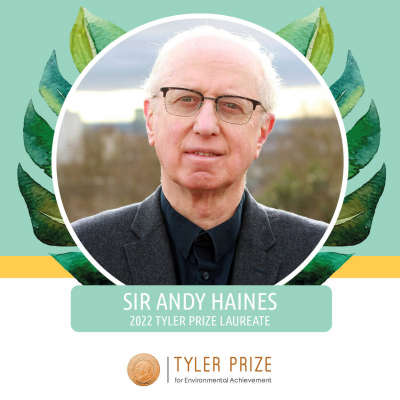


The 2022 Tyler Prize for Environmental Achievement – often regarded as the ‘Nobel Prize for the Environment’ – has been awarded to British physician Sir Andy Haines, one of the first scientists to sound the alarm that changes to the natural environment have dangerous implications for human health. Haines, who co-chairs the IAP project on Climate Change and Health, worked as a family doctor and researcher before realizing that the greatest thing he could do for human health was to reveal its critical connection to the health of our planet. He has since committed over three decades to understanding and working to prevent the impacts of environmental change, especially climate change, on human health.
Tyler Prize Executive Committee Chair Julia Marton-Lefèvre said that since identifying this crucial interlinkage in the early ‘90s, Haines has worked urgently to establish the evidence base for global climate action and policy change. “As a leader in Planetary Health, Sir Andy’s findings have been a wake-up call for humanity. He has focused his life’s work on building international, multidisciplinary research and collaborations that form strategies and policies to protect global health – especially in vulnerable low-income countries – in our rapidly changing planet.”
Haines, who is Professor of Environmental Change and Public Health at the London School of Hygiene & Tropical Medicine, said it is a “great honor and privilege” to be selected as the recipient of the 2022 Tyler Prize. “I think it reflects the growing awareness that climate change isn’t just about damaging the environment – according to the World Health Organization, ‘climate change is the single biggest health threat facing humanity’.
From the effects of extreme heat and wildfires to effects on infectious disease transmission, food supply, migration, poverty... climate change can affect health in so many ways.” “Our future depends on taking urgent action, to adapt to the changes we are already experiencing and to cut the greenhouse gas emissions causing climate change,” Haines said.
Haines was among the first to research the health benefits of low-carbon actions – including cycling, walking and using public transport instead of driving, as well as using clean, renewable energy and eating a more plant-based diet.
“Policies and actions to reduce greenhouse gas emissions will not only benefit human health by reducing the risk of dangerous climate change in the longer term, but they also have positive near-term benefits, including from reduced air pollution, increased physical activity, and improved nutrition,” Haines said.
Dr. Jonathan Patz, Director at the Global Health Institute at the University of Wisconsin-Madison and member of the Tyler Prize Executive Committee, said that Haines’ work highlighted the need to approach public health from a global perspective.
“It’s timely that in 2022, now into the third year of the global Covid-19 pandemic, the Tyler Prize Committee chose to honor a ‘one planet’ leader in public health. We need urgent action on these interconnected issues – and Sir Andy’s interdisciplinary work is out front.”
Haines said the COVID-19 pandemic highlights the fragile relationship between society, the economy and health.
“We live on a small planet – we are all connected whether we like it or not. We don’t have a lot of time to reduce the risks of climate change – inaction and pessimism are luxuries we can’t afford,” he said. “We need to work together and cooperate globally to address the big challenges of our time.”
Haines will receive a US$200,000 prize and join the ranks of previous Tyler Prize Laureates such as Michael E. Mann, E.O. Wilson, and Jane Goodall.
The Tyler Prize is administered by the University of Southern California.
